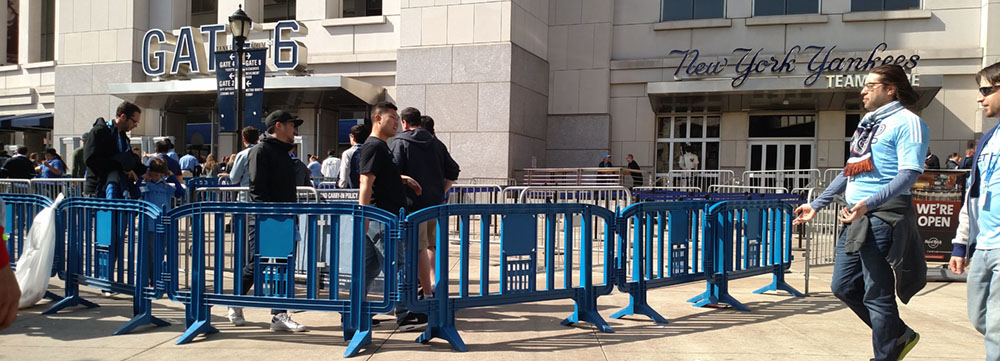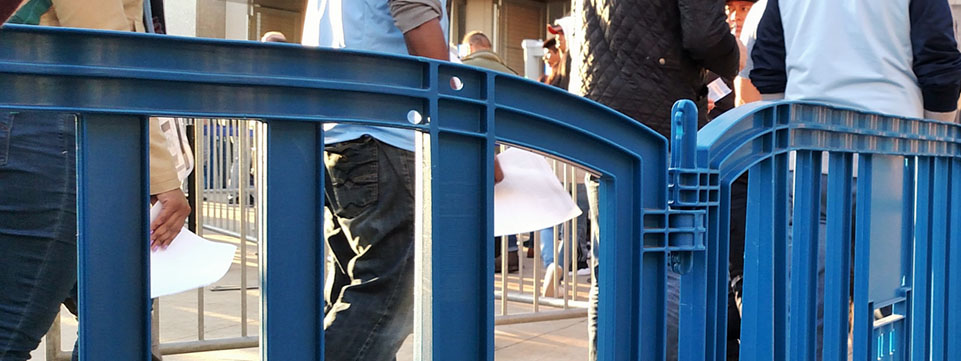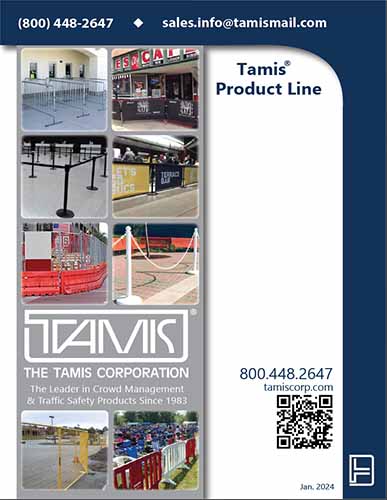Innovative Uses of Crowd Control Barriers: Beyond the Ordinary
Last updated Monday, January 15th, 2024

Table of Contents
Introduction to the Innovative Uses of Crowd Control Barriers
Crowd control barriers are often seen as mere functional tools used to manage and direct crowds, especially in busy public areas and during events. However, the innovative uses of crowd control barriers has expanded beyond traditional applications, transforming them into versatile tools that serve multiple purposes. This post explores how crowd control barriers have evolved from basic safety devices to multifaceted elements in various settings.
The integration of crowd control barriers into diverse environments shows the adaptability and importance of these tools in modern society. From event management to urban planning, the innovative applications of crowd barriers have significantly contributed to public safety, space optimization, and aesthetic enhancement. In this exploration, we will uncover how crowd control barriers are being used in novel and inventive ways.
Understanding the evolution and innovative uses of crowd control barriers not only provides insights into their versatility but also inspires new ways to utilize them in future projects. Whether in managing large crowds, enhancing public safety, or contributing to the aesthetic appeal of an environment, these barriers play a crucial role in our day-to-day lives.
Section 1: The Evolution of Crowd Control Barriers
Crowd control barriers have undergone significant changes since their inception. Initially designed for simple crowd management tasks, these barriers have evolved to meet the changing demands of public safety and space management. This evolution reflects the need for more efficient, flexible, and aesthetically pleasing crowd control solutions in various settings.
The transformation of crowd control barriers is evident in their design and functionality. From basic metal barricades to sophisticated, branded, and technologically integrated systems, these barriers now offer enhanced functionality while contributing to the overall ambiance of the environment. This shift not only improves their practicality but also allows for a more seamless integration into different contexts.
The evolution of crowd control barriers is a testament to the changing landscape of public space management. As the needs and expectations of crowd management continue to grow, these barriers are adapting to offer more than just safety and order. They are becoming integral components of space design, reflecting the importance of functionality and aesthetics in modern environments.

Section 2: Case Studies of Innovative Uses of Crowd Control Barriers
One notable example of innovative uses of crowd control barriers is seen in the entertainment industry. Concerts and festivals often utilize barriers not just for crowd control but also as platforms for stage lighting, branding, and signage. This dual functionality not only ensures safety but also enhances the visual experience for attendees, making the barriers a part of the show itself.
In urban settings, crowd control barriers are being used creatively to manage pedestrian traffic during large public events. Cities are adopting customized barriers that blend with the urban environment while serving their primary purpose. These barriers are often adorned with artwork or city branding, transforming a functional item into a piece of urban art.
Moreover, crowd control barriers are increasingly used in sporting events, not just for crowd management, but also for enhancing fan experience. For instance, at car racing events, barriers are strategically placed not only for safety but also for optimal viewing experiences. They are designed to provide clear sightlines, ensuring that spectators can enjoy the event without compromising on safety.
You can find custom branding options at our Jacket Barriers division and Brand House Graphics division websites.
Section 3: Barriers in Urban Spaces
In urban planning, using crowd control barricades has become a tool for more than just managing pedestrian flow. They are being used to enhance the aesthetic appeal of public spaces. Cities are incorporating artistically designed barriers that complement the urban landscape, turning functional items into elements of urban art.
This trend is particularly evident in historical or culturally significant areas. Here, crowd barriers are designed to blend with the architectural and cultural context, respecting the integrity of the space while serving their essential function. This approach shows a sensitivity to the historical and aesthetic value of public spaces.
Furthermore, urban festivals and outdoor markets are utilizing crowd barriers as part of their layout design. These barriers are arranged to create a flow that maximizes space utility and enhances visitor experience, proving that functionality and aesthetics can coexist harmoniously in urban planning.

Section 4: Technology Integration in Crowd Management
The integration of technology into crowd control barriers is revolutionizing crowd management. Modern barriers are equipped with digital signage, providing real-time information to the public. This feature is particularly useful in dynamic environments like airports or train stations, where timely information is crucial.
Additionally, some barriers now incorporate QR codes, allowing people to quickly access information about the event or location directly from their smartphones. This integration of technology not only streamlines crowd management but also enhances the overall experience for attendees by providing them with easy access to information.
Looking forward, the potential for further technological integration is immense. We might see the adoption of IoT (Internet of Things) technologies, enabling real-time monitoring and management of crowd dynamics. This could lead to smarter, more efficient crowd control strategies that adapt to changing conditions in real-time.
Section 5: The Future of Crowd Control
As we look to the future of crowd control is poised to be shaped by sustainable and smart technologies. We anticipate a growing emphasis on eco-friendly materials in barrier construction, aligning with global environmental sustainability goals. Barriers made from recycled materials or designed to be easily recyclable could become the standard, reducing the environmental footprint of crowd management tools.
Future innovative uses of crowd control barriers will likely also focus on enhancing user safety and convenience. We might see the development of barriers with improved ergonomics, reducing the risk of injury for both attendees and staff. Additionally, barriers could be designed to be more easily deployable and transportable, making them more convenient for use in a variety of settings.
Lastly, the integration of advanced technologies, such as AI and machine learning, could lead to the development of smart barriers that dynamically adjust to crowd movements and densities. This would represent a significant leap in crowd management, allowing for real-time, responsive control strategies that enhance both safety and efficiency.

Conclusion
The innovative uses of crowd control barriers highlight their importance beyond basic crowd management. These barriers are evolving into multifunctional tools that enhance safety, improve experiences, and contribute to the aesthetic appeal of public spaces. As they continue to adapt and integrate with technology and design, crowd control barriers are set to play an even more crucial role in the management of public spaces.
For those looking to explore the full potential and innovative uses of crowd control barriers for their events or public spaces, Tamis Corporation offers a range of innovative and customizable solutions and we have worked with individuals and companies of all sizes. We also belong to some of the most prestigious associations like the International Association of Fairs & Expositions.
Contact us to discover the benefits of using crowd control products, how they can meet your specific needs and elevate the safety and efficiency of your space.



